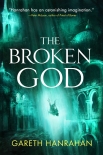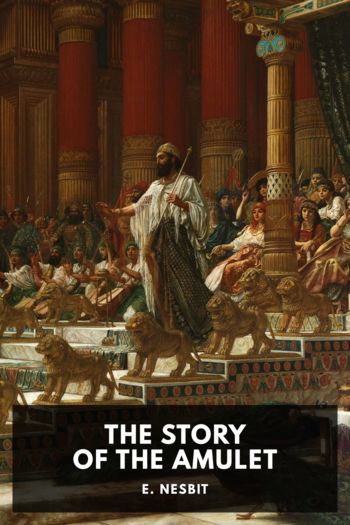The Broken God, Gareth Hanrahan [best historical biographies TXT] 📗

- Author: Gareth Hanrahan
Book online «The Broken God, Gareth Hanrahan [best historical biographies TXT] 📗». Author Gareth Hanrahan
Adro’s full of excitement, humming with manic energy, like they’re drinking wine-of-poets and not cheap Paravosi red. Cari can’t tell if it’s just sheer excitement, or if he feels compelled to put on a show for her, to cram all the jokes and conversation they missed out on over the last five years into a single evening.
Cari curls her legs under her, listening to Adro tell for the hundredth time the story of how they stole from the Eyeless. All three of them were there, but Adro’s told the story so many times it’s transmuted into something unfamiliar and new. She barely recognises herself in the swashbuckling, devil-may-care rogue he describes – although it reminds her of tales of the Saint of Knives. She envies those past selves, who weren’t so laden down with fears and worries, or who had miraculous powers to strike back against the world.
She lets herself imagine what her friends in Guerdon would make of this. Imagines Rat – Rat as he used to be, the hunched little ghoul, not the hulking, horned Elder Ghoul he became. Rat would be skulking in the corner, grumbling as he picked stringy vegetables out of his bowl. He’d only eat the pork. But when Adro sang, Rat would sway back and forth, his hooves tapping along to the melody.
And Spar – Spar as he was when he was alive, before the fall. Spar would sit over there, at the far end of the table from the captain, so he wouldn’t risk touching anyone and spreading the Stone Plague. Spar would be a cooling presence, a counterweight to Adro’s levity. She can imagine him getting into an argument with Captain Hawse. Or coming up with some plan to save the survivors of Ilbarin. Leaning forward, earnest. His voice grave. You have a ship, sir. And, for what it’s worth, the favour of a god. And you, Adro – you have a child. Do you really want your daughter to grow up in chains? My father Idge wrote there are moments in time when things can change, when forces balance and it’s possible for individual people to remake the world.
And she’d shout for everyone to take a drink whenever he mentioned Idge. Their old drinking game.
She becomes gradually aware that Adro stopped talking several minutes ago; she’s the one talking now, the words flowing out of her like her heart’s been opened. She tells them everything, all her burdens slipping from her as she explains about the Black Iron Gods, about the Thay family and her grandfather’s experiments. About coming back to Guerdon, finding Spar and Rat. About the Tower of Law, Professor Ongent, the Ravellers. The Gutter Miracle. Spar’s strange survival after death, and becoming the Saint of Knives. How she drove the Ghierdana from the streets of her city, about how Ishmere invaded and Spar exhausted himself fighting to defend the New City and those who’d taken refuge there.
How she killed a goddess.
It all comes out, a wild confession, disorganised and tangled. She has no idea if she’s making any sense, or if she comes across as a madwoman raving about gods and monsters.
The captain just listens, drinking it all in. He nods in recognition when Cari tries to describe the awful feeling of direct communion, and it’s reassuring.
Adro looks like a man caught in a tidal wave, buffeted and battered by the rushing words. He grabs on to what he recognises – when Cari talks about kicking Artolo out of the New City, Adro grips her arm tightly and hisses, “He’ll fucking kill you”, like she doesn’t know that already. Mostly, though, he’s slack-jawed, his energy draining away until he’s gnawing on his knuckles, staring at Cari in mounting confusion.
“Your friend, Spar – is he dead?” asks Adro.
“Death,” intones the captain, “is a shedding of long burdens. It is in death we know who we truly were in life. We are scraped clean of distractions and doubts, washed and refined, until that singular quality is known.”
Adro throws a frightened glance at the captain, but his attention is on Cari.
She shrugs. “He died. He changed. He’s dying again. Or he’s still dying, I don’t know. But it’s not… it’s not right. It’s not fair. It’s why I’ve got to get to Khebesh.”
“What if you don’t?” asks Adro. “What if they can’t help you?”
She searches for a response, but can’t find one. The thought’s like a black abyss, a fall without end. Her old life ended when the Tower of Law fell on her back in Guerdon, when the Black Iron Gods started communing with her. Spar’s been the one constant in that new life. Hell, worrying about Spar has been a constant thread. Taking care of him is the thread she’s been holding on to. It tied her to the New City.
If that thread breaks, what does she have left?
Once, she might have toyed with the idea of returning to her old life. Coming back here to the Rose, to Hawse and Adro and the rest, to go adventuring again, buccaneering across the seas. But the Rose is beached and broken, and the captain’s become a crazy hermit, Adro’s married, and the rest are dead or scattered.
She could go wandering, go see the world – but the world’s breaking, too. Everyone said Guerdon was the last safe city, the last place untouched by the Godswar, but that’s not true any more. Gods can’t die, not without a god-bomb, and how do you end a war where the combatants can’t die? They’ll just keep fighting, keep stumbling back into the fray. There’s no sea wide enough to hide from the gods. Running’s always been her first and last resort, but there’s nowhere to run to.
“We do not know ourselves,” says the captain, “until we fall. We mistake our everyday circumstances, whatever equilibrium we have found,





Comments (0)